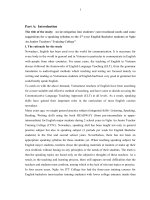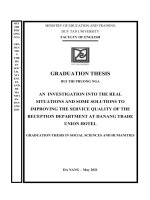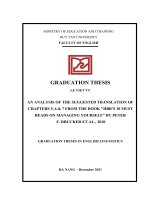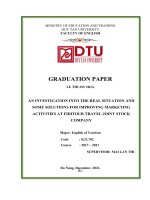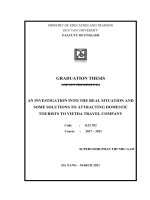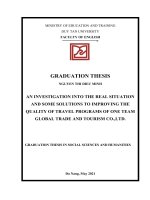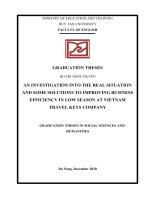An investigation into the real situation and some solutions for enhancing the english proficiency of the reception department at hai an beach hotel spa
Bạn đang xem bản rút gọn của tài liệu. Xem và tải ngay bản đầy đủ của tài liệu tại đây (502.56 KB, 77 trang )
DUY TAN UNIVERSITY
FACULTY OF ENGLISH
ĐỖ THỊ THÙY DƯƠNG
AN INVESTIGATION INTO THE REAL SITUATION
AND SOME SOLUTIONS FOR ENHANCING THE
ENGLISH PROFICIENCY OF THE RECEPTION
DEPARTMENT AT HAI AN BEACH HOTEL & SPA
GRADUATION PAPER IN ENGLISH LINGUISTICS
DA NANG, 2023
DUY TAN UNIVERSITY
FACULTY OF ENGLISH
GRADUATION PAPER
AN INVESTIGATION INTO THE REAL
SITUATION AND SOME SOLUTIONS FOR
ENHANCING THE ENGLISH PROFICIENCY OF
THE RECEPTION DEPARTMENT AT HAI AN
BEACH HOTEL & SPA
Major: English for Tourism and Hospitality
SUPERVISOR
: NGUYỄN ĐẮC QUỲNH ANH, M.A
STUDENT
: ĐỖ THỊ THÙY DƯƠNG
CLASS
: K25 NAD2
STUDENT CODE : 25203100634
DA NANG, 2023
ACKNOWLEDGEMENTS
This graduation thesis is an achievement of my great effort during the
period of learning at school for my major, English for Tourism. It could not
be finished without invaluable help and encouragement from many quarters.
First of all, I feel so grateful to all the teaching staff of the English
department for supporting me a lot to finish my study during four years at
Duy Tan University.
Secondly, I cannot complete the whole graduation paper without my
supervisor, Ms Nguyen Dac Quynh Anh, who has worthy advice and many
experienced years. Therefore, I want to express my deep thanks to Ms Quynh
Anh with the best regard because of her enthusiastic guidance.
I also sincerely thank the Board of Directors of Hai An Beach Hotel &
Spa for allowing and creating favorable conditions for me to practice and
work at the Hotel. I would like to thank Ms. Dieu Tai (Head of Reception
Department) for helping me a lot in the internship process and for suggestions
on building my graduation thesis.
Finally, I would like to wish Ms. Nguyen Dac Quynh Anh and all the
teachers in the Faculty of English health and success in their noble careers. I
wish all the colleagues in Hai An Beach Hotel & Spa always health and great
achievements in their work.
I wish all of you good health and success.
Yours sincerely,
Student
Do Thi Thuy Duong
STATEMENT OF AUTHORSHIP
Except where reference is made in the text of the thesis, this thesis
contains no material published elsewhere or extracted in the whole or in part
from a thesis by which have qualified for or been awarded another degree or
diploma.
No other person’s work has been used without due acknowledgement in
the thesis.
This thesis has not been submitted for award of any degree or diploma in
any other tertiary institution.
Da Nang, May 2023
DO THI THUY DUONG
ABSTRACT
This study aimed to measure the English proficiency of 15 front office
staff who worked at Hai An Beach Hotel & Spa, questionnaire and interview
were used as the research instruments in order to gather data. The
questionnaire was divided into four parts: listening, speaking, writing and
reading. The interview has 4 questions about frequency and difficulty in using
English.
The findings showed that the receptionists were able to communicate in
English at a moderate level because they had difficulties in using English,
such as pronunciation and specific terms. Speaking and listening were the
most important skills in the workplace, while writing and reading were less
important. Therefore, the receptionists should improve their speaking and
listening skills the most in order to send effective messages to their
customers. The data from the findings could improve the management of the
hotel by helping the staff develop some important English skills. In addition,
the findings could be useful for the management of the hotels.
TABLE OF CONTENTS
ACKNOWLEDGEMENTS..................................................................................................i
STATEMENT OF AUTHORSHIP....................................................................................ii
ABSTRACT.........................................................................................................................iii
TABLE OF CONTENTS....................................................................................................iv
LIST OF TABLES.............................................................................................................vii
LIST OF FIGURES..........................................................................................................viii
CHAPTER 1: INTRODUCTION.......................................................................................1
1.1. Rationale....................................................................................................................1
1.2. Aims and Objectives..................................................................................................2
1.3. Significance................................................................................................................3
1.4. Scope of the study......................................................................................................3
1.5. Methodology..............................................................................................................3
1.5.1. Research questions.............................................................................................3
1.5.2. Participants.........................................................................................................4
1.5.3. Instruments for data collection.........................................................................4
1.6. Organization of the Study........................................................................................5
CHAPTER 2: THEORETICAL BACKGROUND...........................................................7
2.1. Tourism in Vietnam..................................................................................................7
2.2. Some important definitions......................................................................................8
2.2.1. English proficiency.............................................................................................8
2.2.2. Hotel.....................................................................................................................8
2.3. English for Tourism..................................................................................................9
2.3.1. The popularity of English in Tourism in Vietnam..........................................9
2.3.2. The importance of English in Tourism..........................................................10
2.4. Requirements for Tourism’s labour resources.....................................................11
2.4.1. General requirements......................................................................................11
2.4.2. Language requirements for receptionists......................................................12
2.5. English for hotel receptionists................................................................................13
2.5.1. English proficiency of hotel receptionists.......................................................13
2.5.2. The use of the English language for hotel receptionists................................14
2.5.3. Problems in using English at work.................................................................17
CHAPTER 3: CASE DESCRIPTION..............................................................................18
3.1. An overview Hai An Beach Hotel & Spa...............................................................18
3.1.1. General Information........................................................................................18
3.1.2. The Organization Chart of Hai An Beach Hotel & Spa...............................20
3.2. Introduction about The Front Office Department...............................................23
3.2.1. Introduction about The Front Office Department........................................23
3.2.2. Framework Organization of the Front Office Department.........................24
3.3. Services products of hotel.......................................................................................25
3.3.1. Accommodation service...................................................................................25
3.3.2. Food and Beverage Service..............................................................................26
3.3.3. Additional Service............................................................................................26
CHAPTER 4: ANALYSIS AND EVALUATION...........................................................28
4.1. Participants’s information of Front Office Department.....................................28
4.2. General information about the use of English of Reception Department..........30
4.3. The frequency of English of Receptionist Department........................................33
4.3.1. The frequency of speaking activities...............................................................33
4.3.2. The frequency of listening activities...............................................................35
4.3.3. The frequency of reading activities.................................................................37
4.3.4. The frequency of writing activities.................................................................38
CHAPTER 5: DIFFICULTIES AND SOLUTIONS......................................................40
5.1. Difficulties in enhancing the use of English of the Receptionist.........................40
5.1.1. Difficulties in using speaking skills.................................................................40
5.1.2. Difficulties in using listening skills..................................................................42
5.1.3. Difficulties in using reading skills...................................................................44
5.1.4. Difficulties in using writing skills....................................................................45
5.2. Solutions to enhance the English proficiency of the Receptionist.......................47
CHAPTER 6: CONCLUSIONS AND SUGGESTIONS................................................50
6.1. Conclusions..............................................................................................................50
6.2. Suggestions...............................................................................................................50
6.2.1. Suggestions for the Front Desk Department..................................................50
6.2.2. Suggestions for Faculty of English and Duy Tan University.......................51
6.3. Litmitations of the study.........................................................................................52
REFERENCES
APPENDIX 1
APPENDIX 2
LIST OF TABLES
LIST OF FIGURES
Figure 4.3: The Importance of English Language Use in the Hotel Industry. 31
Graduation Paper
1
Supervisor : Nguyen Dac Quynh Anh, M.A
CHAPTER 1: INTRODUCTION
1.1. Rationale
Tourism has grown rapidly in recent years, becoming a leading
economic sector that contributes significantly to the economic, cultural,
political, and social development of many countries while also providing
many jobs and wages to local residents. With the advancement of
international relations between countries, English plays an increasingly
important role in the world and becomes an essential component of all
businesses. It can clearly be seen that the use of English as a second language
has grown in popularity throughout the world, including the Vietnamese
context, especially in the hospitality industries. The most popular language,
which is English, is required to facilitate effective communication among
stakeholders of this field, which is English, for most contract communication
or association, cooperation with other countries around the world.
Furthermore, foreign language proficiency is becoming increasingly
important for Vietnamese travel agencies. People use English for
communication, travel, cultural exchange, commerce, and a variety of other
purposes. Many people must learn English to stay competitive in their fields
in order to keep up with the demands of modern society. It is also expected
that the number of international tourists visiting Vietnam from countries
where English is the primary language of communication will increase in the
future. As a result, English communication skills are more important than
ever. More qualifications and skills are required, particularly for hotel staff.
In hotels, English is the most common language. Every day, Hai An
Beach Hotel & Spa must deal with more than 80% of international tourists.
As a result, Hai An Beach Hotel & Spa emphasizes on English language
interviews and assessment of English-related abilities during the employment
Student: Do Thi Thuy Duong
Code: 25203100634
Graduation Paper
2
Supervisor : Nguyen Dac Quynh Anh, M.A
process. The bulk of the hotel's employees, particularly the front desk
personnel
speak English well and competently. However, some hotel
receptionists' English remains poor, making communication with foreign
guests difficult.
English has become the official language of the hotel industry. With
good English communication skills, the front desk department will understand
and respond to what their customers need, allowing them to introduce, serve,
and provide the needs of guests while also proving their worth. Show
professionalism and knowledge of customer psychology. As a result, the
quality of services and products will improve, and hotel's reputation will
develop and grow. After two months internship at the hotel's front desk, and
with dedicated guidance from the instructor, the topic of the study was chosen
is “AN INVESTIGATION INTO THE REAL SITUATION AND SOME
SOLUTIONS FOR ENHANCING THE ENGLISH PROFICIENCY OF THE
RECEPTION DEPARTMENT AT HAI AN BEACH HOTEL & SPA'' for
this graduation thesis.
1.2. Aims and Objectives
Aims
The research is finding out the needs of using English for the Front
Desk staff of Hai An Beach Hotel & Spa. Receptionists are frequently
required to speak English to communicate with foreign tourists. English is
essential for welcoming and greeting, providing information, giving
directions as well as sharing about Vietnamese culture. Furthermore,
personnel encounter challenges such as a lack of confidence while
communicating, a lack of vocabulary and grammar skills, and tourists from a
variety of nations with varying speaking speeds. In addition, they have
diverse accents when speaking English, making listening and understanding
Student: Do Thi Thuy Duong
Code: 25203100634
Graduation Paper
3
Supervisor : Nguyen Dac Quynh Anh, M.A
more challenging. This study will provide a solution to the concerns
mentioned above in order to help enhance the English proficiency of the Front
Desk Department.
Objectives
The goal of this research is to survey and recommend solutions to
improve the English proficiency of the front desk staff at Hai An Beach Hotel
& Spa. The study focuses on determining the current state of the reception’s
staff use of English in communicating with foreign guests, analyzing the
current state of English proficiency in order to promote strengths and
overcome weaknesses, and providing solutions. Assist front-desk employees
in improving their English skills.
1.3. Significance
The findings of this study are expected to provide knowledge and
information about the English proficiency of the Reception Department, their
use of English at work, and some difficulties they may encounter. Also, it
suggests some possible solutions to enhance English proficiency in the
Reception Department and how to overcome challenges at work.
1.4. Scope of the study
The purpose of this research is to improve the English skills of
receptionists at Hai An Beach Hotel & Spa. The study was conducted in 2
months (from March 16 to May 10) to identify the English ability and the
importance of English for hotel receptionists as well as to provide some
suggestions to help them enhance their English skills, which greatly
contribute to the development of the hotel. As a result, this topic is beneficial
to the front desk staff at Hai An Beach Hotel & Spa.
1.5. Methodology
1.5.1. Research questions
Student: Do Thi Thuy Duong
Code: 25203100634
Graduation Paper
4
Supervisor : Nguyen Dac Quynh Anh, M.A
This current study aims to answer two following questions:
1. What is the English proficiency of Receptionists of Hai An Beach Hotel &
Spa?
2. How important is English for the job as a receptionist of Hai An Beach
Hotel & Spa?
1.5.2. Participants
The participants of this research were 15 hotel employees, ranging from
20 to 40 years old with different job positions in their hotel. They were hotel
managers, front desk officers, guest relation officers, and receptionists. The
participants of this study were informed clearly of all the information of this
study and they all agreed to participate in the research. All information in the
collected data that may reveal participants' identities will be removed. The
research information will be kept confidential.
1.5.3. Instruments for data collection
1.5.3.1. Questionnaire
The questionnaire was divided into four parts with 53 questions. The
first part of the questionnaire has 3 questions to record some general
information about the participants. Participants are requested to give answers
briefly about their name, age, and education level.
The second part of the questionnaire consists of 10 questions. These
questions relate to the necessity of using English, the importance of English in
hotels.
The third part of the questionnaire consists of 24 questions designed in
the form of Likert scale. The questions in this section indicate the frequency
of English skills. Likert scale is applied in the questionnaire as it allows the
participants to easily choose the options reflecting their opinions. Moreover,
once all responses have been received, it would be easy to analyze them. In
Student: Do Thi Thuy Duong
Code: 25203100634
Graduation Paper
5
Supervisor : Nguyen Dac Quynh Anh, M.A
the questionnaire, instead of being organized in clusters, these Likert scale
items are mixed intentionally in order to receive the objective and unbiased
viewpoint of the participants. All the questions are to answer the 2 research
questions.
The fourth part has 16 questions that requested participants to answer
about difficulties in using listening, speaking, reading and writing skills.
These difficult questions are referenced from the research of (Nawamin
Prachanant, 2012). Therefore, these difficulties are included in the
questionnaire to test and consider their appropriateness for front desk staff.
This study's instruments are a questionnaire created with Google
Forms. All participants received the questionnaire by Email and directly from
the researcher. The questionnaire for participants included several questions
about the importance of English proficiency in the front office and the issues
that occur when they use English there.
1.5.3.2. Interview Data Collection Procedures
The researcher offered 4 interview questions to various receptionists
and managers in order for the participants to better grasp the nature of the
interview, and received some suggestions such as shortening. Interview
questions and translating all questions from English to Vietnamese. So all
interview questions have been translated and rewritten to be more concise in
Vietnamese.
The average time of each interview is about 15 minutes. All interviews
were conducted in Vietnamese, live and recorded. The researcher took notes
and transcribed all the recordings after data collection, then translated them
into English.
Student: Do Thi Thuy Duong
Code: 25203100634
Graduation Paper
6
Supervisor : Nguyen Dac Quynh Anh, M.A
In summary, based on hotel permission, the researcher interviewed the
front desk staff for about 10 to 15 minutes each, including using the first two
minutes to get demographic information and 13 or 14 minutes for interview.
Therefore, the author was only able to conduct individual interviews
with four receptionists at the hotel.
1.6. Organization of the Study
This study presented 6 chapter
Chapter 1: Introduction which includes rationale, aims and objectives, scope
of the study, method of the study and organization of the study
Chapter 2: Theoretical Background
Chapter 3: Case Description
Chapter 4: Analysis and Evaluation
Chapter 5: Difficulties and Suggested Solutions
Chapter 6: Conclusions and Suggestions
Student: Do Thi Thuy Duong
Code: 25203100634
Graduation Paper
7
Supervisor : Nguyen Dac Quynh Anh, M.A
CHAPTER 2: THEORETICAL BACKGROUND
2.1. Tourism in Vietnam
Tourism is one of the fastest growing industries in the world and a
major source of foreign exchange and job creation for many countries.
Vietnam's tourism is considered a spearhead economic sector due to the
country's diverse and rich tourism potential. Vietnam has a vast history of
thousands of years, with a long history of traditional culture, monuments, rich
and diversified landscapes, and many other tourist resources.
Tourism in Vietnam has gradually developed throughout the years,
paralleling the country's rejuvenation. According to the World Economic
Forum's 2022 report, Vietnam's tourist development capacity index in 2021
ranks 52nd, up 8 places from 2019, and joins the group of one of three nations
with the best growth rate in the world. According to the National
Administration of Tourism, the tourism industry in Vietnam contributed
roughly 9.2% of the country's GDP in 2019 and created nearly 3 million jobs.
International tourists up 16.2% from 2018. Vietnam has overtaken Indonesia
to rank fourth in the ASEAN area in terms of international visitors,
consistently among the countries with the world's fastest visitor growth rates.
Vietnam is also one of the few countries recognized by UNESCO as a country
with many heritages and landscapes that attract international tourists to travel.
However, there are still constraints in Vietnam's tourism business, such
as a low rate of repeat visitors. Because Vietnam's tourism offerings are
unappealing, there is a scarcity of connectivity and entertainment options.
Customer service services are not diverse, promotion and advertising activity
is poor due to insufficient resources, an ineffective management system, and
the absence of an international tourism promotion office. The tourism
Student: Do Thi Thuy Duong
Code: 25203100634
Graduation Paper
8
Supervisor : Nguyen Dac Quynh Anh, M.A
development assistance fund has not been activated, the airport infrastructure
is overburdened, unable to meet the high growth rate of visitors, and the entry
visa policy remains limited in comparison to other directly competitive
destinations like Thailand.
2.2. Some important definitions
2.2.1. English proficiency
English proficiency means the ability to make full use of language
skills naturally and flexibly in various situations, including the ability to
listen, speak, read and write. Actual English proficiency is defined as a
passing score on an English proficiency test. Achieving proficiency in English
takes a long time to achieve fluency.
English proficiency indicates a person's exceptional skill in using
language in written or oral communication, indicating how a person
understands and comprehends different English contexts and uses appropriate
grammar rules. It also demonstrates that you have confidently and effectively
integrated the language into your daily life.
2.2.2. Hotel
Each country has its own definition of a hotel, which is based on the
state and development of the hotel industry.
Mr. Morcel Gotie, a tourism and hotel researcher, describes a hotel as
"a place of temporary stay for guests, as well as a chamber and a restaurant
of various grades". The hotel is built on a solid foundation, with multiple
stories and bedrooms that are furnished with amenities and specialized
furniture for commercial purposes such as lodging, catering, and other
services. The classification of hotels is based on their content and intended
usage, such as temporary, convention, and tourism. In addition, the hotel is
rated from one to five stars based on the quality of service and comfort.
Student: Do Thi Thuy Duong
Code: 25203100634
Graduation Paper
9
Supervisor : Nguyen Dac Quynh Anh, M.A
The hotel is a well-known lodging establishment all over the world,
ensuring the quality and comfort required by the lodging industry.
Furthermore, it meets a variety of eating, entertainment, and lodging service
needs that are appropriate for the objective of the trip.
The hotel is a type of business that is founded and registered in order to
profit under the provisions of the law.
In Vietnam, according to the Circular No.01/2001/TT-TCL dated
August 24, 2000 of General Department of Tourism guiding the application
of the Government’s Decree No.39/2000/ND-CP on tourist accommodation
establishments clearly considers: “Hotel is an architectural building which is
independently built with scale of 10 bedrooms or more, ensuring the quality
of facilities, equipment and necessary services for tourists”.
2.3. English for Tourism
2.3.1. The popularity of English in Tourism in Vietnam
The reason for English to become popular is due to the influence of the
United States and United Kingdom on many fields of economy, military,
sciences, informatics, politics and culture. Therefore, many countries around
the world are required to learn English to work. More than 250 million
Chinese people speak and learn English in China, while high school students
in Japan must complete six years of English instruction before graduation. In
Hong Kong, English is taught to 9 out of 10 students. Vietnam has also
incorporated English into the curriculum for students in grades
With the present trend of globalization, English is quickly becoming a
global language that is widely utilized in many aspects of life. According to a
Savills Vietnam report, our country is one of the fastest growing tourist
destinations in Southeast Asia, owing to a variety of positive variables such as
the number of international tourists visiting each day. The world's hotel
Student: Do Thi Thuy Duong
Code: 25203100634
